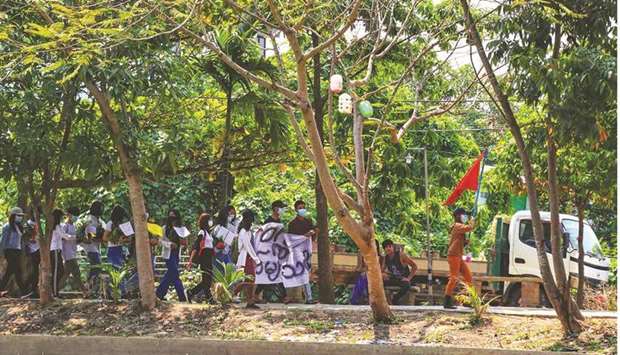The UN rights chief warned yesterday Myanmar could be spiralling towards a “full-blown” Syrian-style conflict, after a two-month crackdown that a local monitoring group says has already claimed more than 700 lives.
Myanmar is in chaos and its economy has been paralysed since the military seized power from civilian leader Aung San Suu Kyi on February 1.
Warning of possible crimes against humanity, the United Nations High Commissioner for Human Rights Michelle Bachelet yesterday urged countries to take immediate action to push Myanmar’s military to stop its “campaign of repression and slaughter of its people.” Daily rallies across Myanmar have been met with live rounds.
At least 710 civilians have been killed as of late Monday, including 50 children, according to a local monitoring group.
“I fear the situation in Myanmar is heading towards a full-blown conflict,” Bachelet said in a statement.
“There are clear echoes of Syria in 2011,” she warned, referring to the start of a civil war that over the past decade has killed nearly 400,000 people and forced more than 6mn to flee the country.
In recent weeks, several of Myanmar’s ethnic rebel groups in some lawless border territories have stepped up attacks on the military and police, raising fears of a broader civil conflict.
The military has retaliated with air strikes, which the Free Burma Rangers — a Christian aid group working in the area — said have displaced more than 24,000 civilians in Karen state by Saturday.
The Rangers, which runs a health clinic in the state, said air strikes had killed at least 20 people and wounded more than 40.
The area is remote and communications are difficult, and AFP has not been able to independently verify the deaths.
Villagers in some areas were unable to prepare their rice crops because of fears the military would shell them in their fields, the aid group said.
“They are afraid they will have no rice harvest next fall,” it said in a statement.
Military attacks sent a few thousand people fleeing into neighbouring Thailand in recent weeks, but most have returned to the Myanmar side of the border.
In Yangon, authorities are hunting those responsible for an underground newsletter titled “Molotov”. The publication was started by a group of young activists to fight ongoing internet outages and information suppression.
“The Molotov journal is illegally published,” the state-run Global New Light of Myanmar said, adding that legal action would be taken against those involved.
At a military tribunal in the city, seven protesters accused over the murder of a suspected informer were sentenced to death, state media said yesterday.
Three of the demonstrators were tried in absentia. The junta yesterday also announced that dozens more people had been added to an arrest warrant list of 260 celebrities, doctors and ordinary citizens.
Many are accused of spreading dissent against the military, while medical professionals are wanted over their work at private clinics, which have taken in injured protesters, according to state media.
Meanwhile, in northwestern Sagaing region, a couple were shot dead while delivering milk after junta troops stormed the town of Tamu, according to the Assistance Association for Political Prisoners (AAPP), a local monitoring organisation.
Young people in cities nationwide continued to take to streets yesterday, some marching with flowerpots.

Protesters take part in a demonstration against the military coup in Yangon’s Thuwana township.
